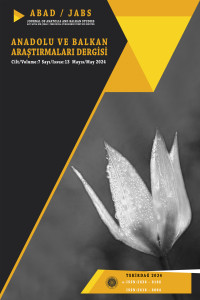Öz
Bu çalışma, Britanya’lı yazar Olivia Manning’in Balkan Üçlemesi’nde anlatılan Balkan savaşının sosyal ve siyasi karmaşası ile kimlik gelişimi arasındaki ilişkiyi incelemektedir. Merkezinde ana karakterler Harriet Pringle ve Guy Pringle’ın yer aldığı hikâye, modern bireyin Balkan Savaşı’nın kaotik ortamında nasıl değiştiğini ve yeniden şekillendiğini göstermektedir. Anthony Giddens’ın modernlik üzerine düşünceleri bağlamında yapılan bu analiz, savaşın bireyselleşmeyi ve öz farkındalığı nasıl hızlandırdığını vurgulamaktadır. Ayrıca, Guy ve Harriet’in ilişkisinin evrimi Giddens’ın karşılıklı dönüşen ilişki kavramı kullanılarak incelemektedir. Ana karakterlerin ilişkilerinin, kişisel büyüme ve varoluşsal mücadeleler ışığında geleneksel aşk ve bağlılık kavramlarına meydan okuyan, baskılar arasında samimiyetin bir örneği olduğunu vurgulamaktayız. Son olarak, bu temaları bir araya getirerek Balkan Üçlemesi’nin günümüzün belirsiz dünyasında öz kimlik ve ilişkilerin karmaşıklıkları hakkında ilginç içgörüler sunduğunu göstermekteyiz.
Kaynakça
- BAUMAN, Zygmunt. Liquid Love: On the Frailty of Human Bonds. Cambridge: Polity Press, 2003.
- BECK, Ulrich, and Elisabeth Beck-Gernsheim. The Normal Chaos of Love. Cambridge: Polity Press, 1995.
- BERGER, Peter L., and Thomas Luckmann. The Social Construction of Reality: A Treatise in the Sociology of Knowledge. New York: Anchor Books, 1966.
- BERMAN, Marshall. All That Is Solid Melts into Air: The Experience of Modernity. Simon & Schuster, 1982.
- EVANS, M. “In defence of satori: Giddens, reflexivity, and the politics of identity.” Critique of Anthropology, 19(4), 1999, 349-368.
- GIDDENS, Anthony. The Consequences of Modernity. Stanford University Press, 1990.
- GIDDENS, Anthony. Modernity and Self-Identity: Self and Society in the Late Modern Age. Stanford: Stanford University Press, 1991.
- JOHNSON, Emily. Prelude to War: The Nazi-Soviet Pact and Its Implications. London: Academic Publishing, 2012.
- MANNING, Olivia. The Balkan Trilogy: The Great Fortune, The Spoilt City, Friends and Heroes. London: Arrow Books, 2004.
- MAZOWER, Mark. Inside Hitler’s Greece: The Experience of Occupation, 1941-44. New Haven: Yale University Press, 1993.
- MEAD, George H. Mind, Self, and Society from the Standpoint of a Social Behaviorist. Chicago: University of Chicago Press, 1934.
- REDMAN, Peter. Identity: A Reader. Edited by Paul de Gay, Jessica Evans and Peter Redman. Sage Publications, 2000.
- SMITH, John. “Identity and Modernity: The Role of War in Shaping Self.” Journal of Historical Sociology 32 (4) 2019, 456-473.
- SMITH, John. 2010. The Axis Alliance and the Balkans. New York: History Press, 2010.
- WILLIAM H. McNeill. The Metamorphosis of Greece Since World War. University of Chicago Press, 1978.
- WILLIAMS, Michael. Eastern Front Turning Points in World War II. Chicago: University Press, 2014.
Öz
This article analyzes the connection between identity development and the socio-political turmoil of the Balkan war as portrayed in British author Olivia Manning’s The Balkan Trilogy. It explores how Harriet Pringle and Guy Pringle, the protagonists, exemplify the model of modern individual, whose identity and self-perception is in constant flux, reshaped by the chaotic environment of the Balkan war. This analysis is framed within the context of Anthony Giddens’ ideas on modernity particularly highlighting how war accelerates individualization and self reflection. Furthermore, we will explore the dynamics of Guy and Harriet’s relationship using Gidden’s concept of mutually transforming and changing love to understand how their partnership evolves over time. We argue that their relationship serves as a microcosm of intimacy amidst pressures challenging traditional notions of love and commitment in light of personal growth and existential struggles. Finally, we bring together these themes to demonstrate how the The Balkan Trilogy provides a platform for exploring the implications of Giddens’ theory of identity in the late modern period. Taking everthing into consideration, we will show that Manning’s narrative offers insights into the complexities of self identity and relationships in today’s changing and uncertain world particularly in the context of war.
Anahtar Kelimeler
Kaynakça
- BAUMAN, Zygmunt. Liquid Love: On the Frailty of Human Bonds. Cambridge: Polity Press, 2003.
- BECK, Ulrich, and Elisabeth Beck-Gernsheim. The Normal Chaos of Love. Cambridge: Polity Press, 1995.
- BERGER, Peter L., and Thomas Luckmann. The Social Construction of Reality: A Treatise in the Sociology of Knowledge. New York: Anchor Books, 1966.
- BERMAN, Marshall. All That Is Solid Melts into Air: The Experience of Modernity. Simon & Schuster, 1982.
- EVANS, M. “In defence of satori: Giddens, reflexivity, and the politics of identity.” Critique of Anthropology, 19(4), 1999, 349-368.
- GIDDENS, Anthony. The Consequences of Modernity. Stanford University Press, 1990.
- GIDDENS, Anthony. Modernity and Self-Identity: Self and Society in the Late Modern Age. Stanford: Stanford University Press, 1991.
- JOHNSON, Emily. Prelude to War: The Nazi-Soviet Pact and Its Implications. London: Academic Publishing, 2012.
- MANNING, Olivia. The Balkan Trilogy: The Great Fortune, The Spoilt City, Friends and Heroes. London: Arrow Books, 2004.
- MAZOWER, Mark. Inside Hitler’s Greece: The Experience of Occupation, 1941-44. New Haven: Yale University Press, 1993.
- MEAD, George H. Mind, Self, and Society from the Standpoint of a Social Behaviorist. Chicago: University of Chicago Press, 1934.
- REDMAN, Peter. Identity: A Reader. Edited by Paul de Gay, Jessica Evans and Peter Redman. Sage Publications, 2000.
- SMITH, John. “Identity and Modernity: The Role of War in Shaping Self.” Journal of Historical Sociology 32 (4) 2019, 456-473.
- SMITH, John. 2010. The Axis Alliance and the Balkans. New York: History Press, 2010.
- WILLIAM H. McNeill. The Metamorphosis of Greece Since World War. University of Chicago Press, 1978.
- WILLIAMS, Michael. Eastern Front Turning Points in World War II. Chicago: University Press, 2014.
Ayrıntılar
| Birincil Dil | İngilizce |
|---|---|
| Konular | Edebiyat Sosyolojisi, Modernleşme Sosyolojisi |
| Bölüm | Makaleler |
| Yazarlar | |
| Yayımlanma Tarihi | 31 Mayıs 2024 |
| Gönderilme Tarihi | 27 Şubat 2024 |
| Kabul Tarihi | 24 Mayıs 2024 |
| Yayımlandığı Sayı | Yıl 2024 Cilt: 7 Sayı: 13 |


